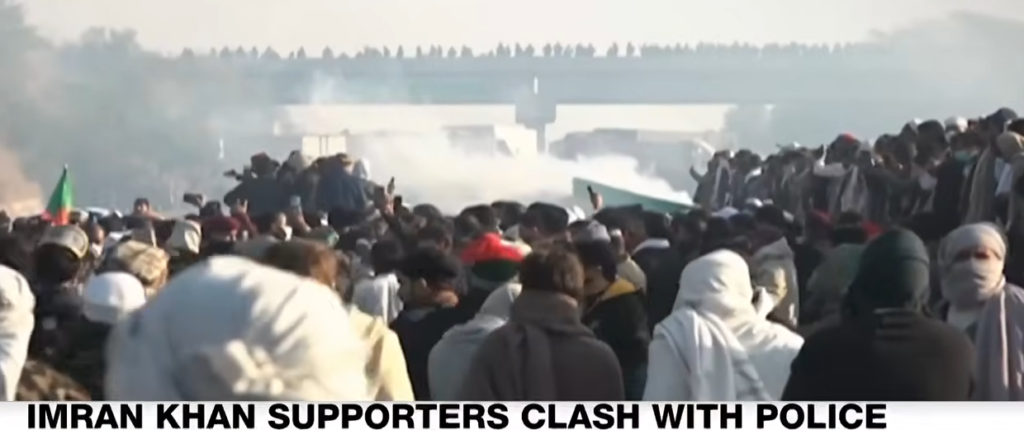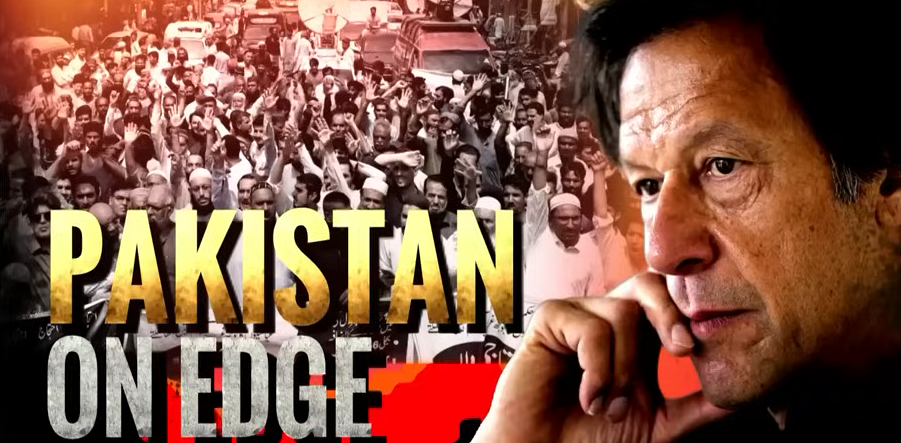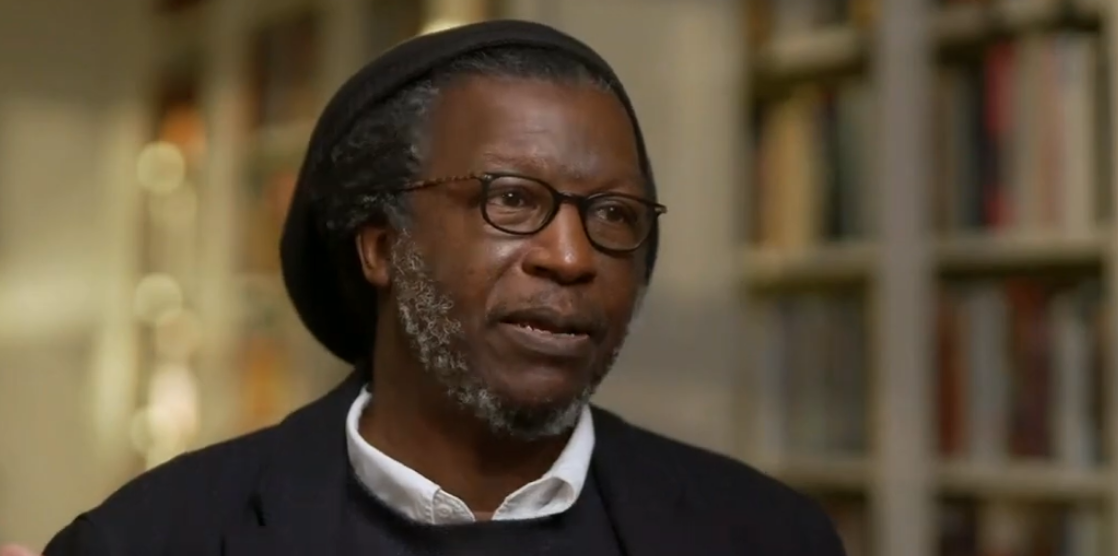By Murtaza Hussain and Waqas Ahmed
Photos: YouTube Screenshots\Wikimedia Commons
One of the legacies of the Biden administration will be its commitment to supporting Pakistan’s military junta government to the very last. Even as evidence has piled up of gross human-rights violations and election interference—and with U.S. Congress members calling on the president to pressure Pakistan—Biden’s State Department has refused to do anything except express support for its leader, general Asim Munir. Now with opposition activists amassing across the country, the country’s government, led by the military-backed Prime Minister Shehbaz Sharif, has begun shooting at protestors, cutting internet access, and blocking roads in an attempt to stifle demonstrations and prevent the rest of the world from following what’s happening. As the government crackdown on the demonstrations intensifies, the U.S. State Department is urging the demonstrators to “refrain from violence” and calling on the Pakistani government “to respect human rights and fundamental freedoms.”

Over the weekend, images of roads teeming with protesters from across Pakistan attempting to make their way to Islamabad, the country’s capital, spread across social media. They are demanding the release of imprisoned former prime minister Imran Khan and the resignation of the military-backed government that ousted him in 2022. By Monday,multiple convoys of PTI supporters had made their way into Islamabad amid heavy police shelling. Due to major roadblocks on all national highways and motorways,other convoys of PTI supporters from the province of Khyber Pakhtunkhwa were still en route, including one being led by Khan’s wife, Bushra Bibi. Notably, rallies were also organized by diaspora activists around the world, including in the U.S.
The demonstrations were spurred by a “final call” from Khan earlier this month in which he asked supporters of his Pakistan Tehreek-e-Insaf (PTI) party to take to the streets until their demands are met. In response, Pakistan’s military government, which took power following the country’s rigged elections in February, has invoked a law banning public gatherings in Islamabad for the next two months.
Despite the crackdowns, senior PTI activists have reportedly entered the city limits of Islamabad, as part of convoys that have been organized to gather in the city center. Images have also begun circulating on social media of PTI supporters in the city trucking in gigantic fans, aimed at blowing away tear gas expected to be fired at protestors by Pakistani police.
The government of Pakistan, already reeling from economic, political, and security crises, has sought to suppress the protests through arrests, and, now, attempts to barricade Islamabad against Khan’s supporters. So far, authorities in Pakistan have arrested an estimated 4,000 PTI supporters. Pakistan’s interior ministry has announced plans to throttle internet access in areas PTI supporters are expected to gather. The interior ministryhas also restricted road and rail access to Islamabad and shut down schools and universities.
Yet these measures are unlikely to stifle support for the PTI or quell the growing outrage over the military’s excesses. After two years of attacks, including extrajudicial detention, torture, disappearances, targeted killings, and even the attempted assassination of Khan himself, polls show that the PTI—despite being banned—remains Pakistan’s most popular political party.
Widely popular in Pakistan, Khan began his political career by campaigning against a U.S. drone program believed to have killed hundreds of Pakistanis. Over the years he continued to challenge Washington, visiting Vladimir Putin on the eve of Russia’s attack on Ukraine. Angered by Khan’s foreign policy stances, U.S. diplomats helped pressure Pakistan’s military to organize the no-confidence vote that resulted in his ouster in 2022, according to leaked classified documents from the Pakistani government.

Since Khan’s removal from power and subsequent imprisonment on corruption charges widely viewed as politicized, the Biden administration has grown close to the military junta, including by brokering arms sales from Pakistan to help facilitate the war in Ukraine. Despite the junta’s brutal crackdown on civil society, the press, and the political opposition, the Biden administration continues to defend its relationship with the regime.
But owing in part to the growing influence of Pakistani-American activist groups, U.S. lawmakers have begun to challenge the Biden administration’s policy of assisting in Pakistan’s descent into authoritarianism.
Last month, a bipartisan group of 46 U.S lawmakers wrote a letter urging President Biden to overhaul U.S. policy towards Pakistan. Spearheaded by Pennsylvania Democratic Rep. Susan Wild and Michigan Republican Rep. John James, the letter marked the first bipartisan rebuke of U.S. policy towards Pakistan since the disputed February 2024 elections, and came just weeks after a group of 60 House Democrats wrote a similar scathing letter. It was signed by several high ranking members of congress, including Republican Joe Wilson, the chairman of the subcommittee on Middle East, North Africa, and Central Asia, and Democratic Rep. Adam Schiff. (Schiff was subsequently elected to the senate.) The letter, along with an earlier letter led by Texas Democratic Rep. Greg Casar, denounced conditions in Pakistan and expressed concerns about Khan’s plight, while raising the possibility of placing sanctions on senior officials involved in human-rights abuses and the suppression of democracy.
Those officials include Pakistan’s powerful military chief Asim Munir, Khan’s chief rival. A day prior to the U.S. presidential election, Pakistan’s parliament passed a bill allowing Munir to extend his term in office until 2027, a move denounced by opposition politicians.
Khan’s reclusive wife, who had been in jail for the past nine months and was freed only recently, has emerged as a significant public figure in the protests, issuing videos encouraging supporters of the party to engage in a final showdown with the military-led government.
“My brothers, as long as Imran is not with us, we will not end this march,” Bibi reportedly stated in an address to protestors taking part in one of the convoys headed to the capital. “I will stay there till my last breath, and all of you have to support me. This is not just about my husband but about the country and its leader.”






